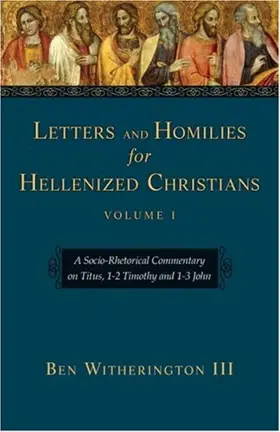

Letters And Homilies for Hellenized Christians: A Socio-Rhetorical Commentary on Titus, 1–2 Timothy And 1–3 John
Pages
623 pages
Publisher
IVP Academic
Published
11/30/2006
ISBN-13
9780830829316
Reviews
Not as detailed as the socio-rhetorical commentaries published by Eerdmans, most of which were written by Witherington. There are a few nitpicky issues where Witherington and I disagree (particularly in 1 John), but overall this a good commentary for pastors and students. It's interesting to see the Pastoral Epistles and the Epistles of John in a volume together. But he gives each its due, covering the rhetorical and contextual features of each of the documents in the introductions, as well and giving a basic exposition of the text, with several excurses to go a bit deeper into particular lexical, contextual, or rhetorical elements.
Witherington’s socio-rhetorical commentary for the Pastoral Epistles was published by IVP rather than Eerdmans, and under the title this more verbose title. If you do not read the subtitles, you might miss the fact that there three volumes are commentaries. They are roughly the same style as the other socio-rhetorical commentaries, providing notes on the English text with Greek transliterated. As with his other similar commentaries, Witherington attempts to read these letters as examples of Greco-Roman rhetoric categories. An interesting wrinkle in this series is that he starts with Titus, rather than 1 Timothy. Usually commentaries start with Timothy and give Titus too little attention. I do find it odd that he includes the letters of John in this volume, making it impossible for me to put the book in a proper place on my OCD shelf.
[Full Review]
Ben Witherington has written a number of what he calls "socio-rhetorical" commentaries on many of the New Testament books. These works provide very helpful contextual information. Recently, Witherington completed three "socio-rhetorical" volumes that cover the Pastoral Epistles, the book of Hebrews, and the General Epistles. Two of the volumes are titled Letters and Homilies for Hellenized Christians, and one is titled Letters and Homilies for Jewish Christians. The first volume includes his commentary on the Epistles of John. It is a helpful work that should be consulted by those doing in-depth study of these letters.
[Full Review]
Downers Grove, Ill.: InterVarsity Press, 2006. Pp. 656. Cloth. $35.00. ISBN 0830829318. Raymond F. Collins The Catholic University of America Washington, D.C. As the subtitle of this volume suggests, Witherington’s commentary is really two books in one, albeit with a common introduction. His general introduction considers two topics: epistolary pseudepigrapha; and sermons and homilies in the New Testament. Rehearsing a variety of what he describes as old chestnuts, Witherington is more than skeptical of the general acceptability of literary pseudepigraphy by Jews and early Christians. His reflection on sermons and homilies permits him to make the point that writings of the New Testament demonstrate the use of a more sophisticated rhetorical technique than modern commentators are wont to acknowledge. Three features of each of the two parts of this commentary work make it a particularly valuable work. The first is that, although one would expect the two bibliographies to begin with at least a selected list of commentaries, Witherington’s consideration of the commentaries is given in a discursive form that provides the reader with a much more useful tool than is the typical list, even an annotated list of commentaries. A second valuable feature of the work is the number of its excursus, presented under the rubric of “A Closer Look.” Fortunately, the excursus are cited in the table of contents.
[Full Review]



